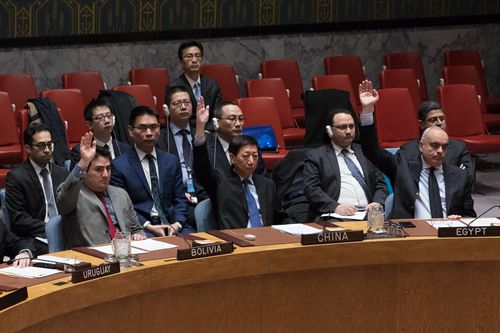| Statement by Ambassador WU Haitao after Voting on the Security Council Draft Resolution on Non-proliferation/DPRK |
| 2017-12-22 07:05 |
|
Resolution 2397 (2017), adopted by the Security Council today, reflects the unanimous position of the international community in opposing the development of nuclear and ballistic missile capabilities by the Democratic People’s Republic of Korea and in safeguarding the international nuclear non-proliferation regime. China urges the Democratic People’s Republic of Korea to seriously heed the demands of the international community, abide by and implement the Security Council resolutions and refrain from conducting any further nuclear and missile tests. At the same time, the resolution underscores that the Korean Peninsula nuclear issue needs to be resolved by peaceful, political and diplomatic means. It also stipulates that the measures it contains are not intended to have an adverse impact on economic activities and cooperation, food aid or humanitarian assistance. China hopes that all the parties will implement the resolution fully and comprehensively. At present, the situation on the Korean Peninsula is one of constant tension. On the one hand, the Democratic People’s Republic of Korea has continued to conduct nuclear tests and missile launches, in defiance of the universal opposition by the international community. On the other hand, parties concerned have continued to expand military exercises and scale up response capabilities by force. The escalation of tension or the risk of the situation spiraling out of control on the Korean Peninsula is not in the interests of any party. The Korean Peninsula nuclear issue has lasted for more than two decades. Reviewing the evolution of the nuclear issue of the Korean Peninsula, We can see that dialogue and negotiations have led to progress in the denuclearization of the Korean Peninsula and the improvement of relations among the parties concerned, while tough posturing and confrontation have impeded denuclearization and resulted in deteriorating relations among the parties concerned. It is imperative to learn from past good practices and mistakes. The Korean Peninsula nuclear issue must be solved peacefully and comprehensively. Security is at the heart of the Korean Peninsula nuclear issue while the fundamental solution rests on addressing the security concerns of all parties, including the Democratic People’s Republic of Korea in a balanced manner. There is no military option for settling the Korean Peninsula nuclear issue. Resorting to force will only lead to disaster. Sanctions are only a means to an end. One should not expect to settle the issue only through sanctions or pressure. History has proven that dialogue and negotiations are the fundamental way in which to de-escalate tension and promote denuclearization on the Peninsula. To that end, all parties should end immediately all rhetoric and action that are detrimental to denuclearization, peace and stability on the Peninsula, in order to de-escalate the situation as soon as possible. All parties should strictly follow the provisions and spirit of the relevant Security Council resolutions to promote an appropriate settlement of the Korean Peninsula nuclear issue. All parties should shoulder their respective responsibilities and effectively assume their obligations. It is imperative to follow the overarching direction leading towards a peaceful settlement and resume dialogue and negotiations at an early date. Any unilateral sanctions imposed outside the purview of the Security Council would only undermine the Council’s unity and jeopardize the legitimate rights and interests of other countries, and should therefore be rejected. China has always advocated for realizing denuclearization of the Peninsula, maintaining peace and stability on the Peninsula, and seeking a solution through dialogue and consultations. We are opposed to turmoil and war on the Peninsula. China has made enormous efforts to reach settlements through dialogue and negotiations, and has paid a higher price than all other parties in implementing the relevant Security Council resolutions. In view of the situation on the Peninsula, China has proposed the suspension-for-suspension proposal, which calls for the suspension by the Democratic People’s Republic of Korea of its nuclear and missile activities and the suspension by the United States and Republic of Korea of large-scale military exercises, and the dual-track approach, which aims to promote parallel progress in denuclearization efforts and the establishment of a peace mechanism on the Peninsula. Russia has also put forward the step-by-step conception to the settlement of the issues of the Korean Peninsula. Based on those proposals, China and Russia have issued a joint statement setting out a road map for resolving the issues of the Korean Peninsula. The joint proposal of China and Russia is aimed at peacefully settling the Korean Peninsula nuclear issue and the maintenance of peace and stability on the Peninsula. Accordingly, we hope that the proposal will elicit responses and support from the concerned parties. If the situation on the Peninsula is allowed to remain stuck in the current vicious cycle, the road will continue to narrow. A peaceful settlement will be reached only when the parties meet each other halfway and conduct dialogue and consultations. The parties concerned should fulfill their historical responsibilities and relaunch dialogue and negotiations as soon as possible so as to settle the Korean Peninsula nuclear issue appropriately and at an early date. China is ready to join with the international community in promoting the Peninsula situation back on the right track of peaceful settlement, and play a positive and constructive role in achieving denuclearization, lasting peace and stability on the Peninsula. |
| |||||||||||||
| |||||||||||||
